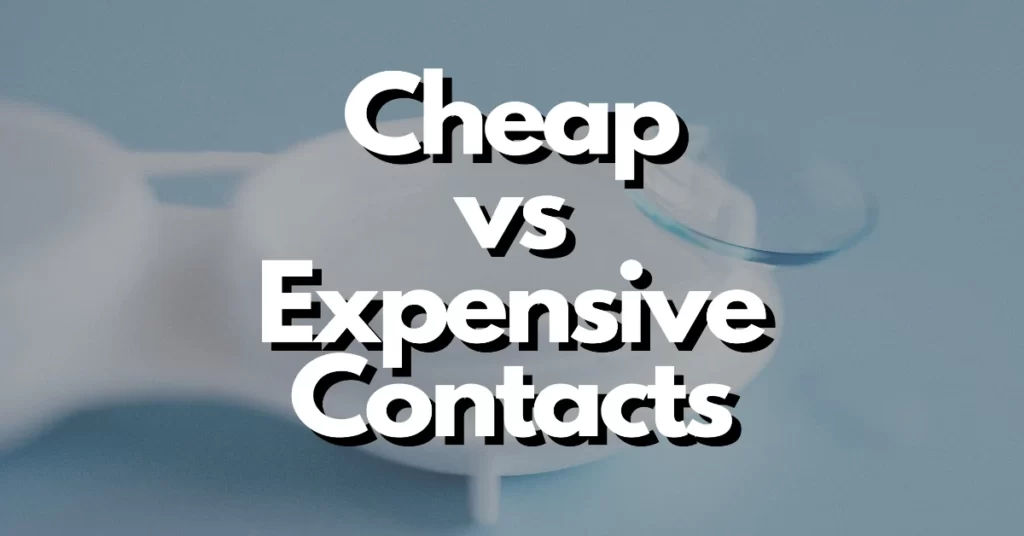Contact lenses have become a convenient and popular alternative to traditional eyeglasses. With a variety of brands, types, and prices available, it’s essential to understand the differences between cheap and expensive contact lenses.
In this article, we’ll explore the pros and cons of each option, helping you make an informed decision about what’s best for your vision and budget.
Cheap Contact Lenses: Affordable Convenience
Pros:
1. Cost-Effective: Perhaps the most apparent advantage of cheap contact lenses is their affordability. They are a budget-friendly option for those looking to correct their vision without breaking the bank.
2. Accessibility: Many discount and online retailers offer a wide range of inexpensive contact lens options. This accessibility makes it easy for individuals to find and purchase cheap lenses.
3. Disposable Options: Cheap contact lenses often come in daily, bi-weekly, or monthly disposable options. This means you can replace them frequently, maintaining good eye hygiene.
4. Easy Replacement: If you lose or damage a cheap lens, it’s not as financially burdensome to replace it compared to an expensive, custom-made lens.
5. Suitable for Beginners: For those new to contact lenses, starting with a cost-effective option can be a smart choice. It allows you to get accustomed to wearing contacts without a significant financial commitment.
Cons:
1. Limited Prescription Range: Cheap contact lenses may not be available in as many prescription options as their expensive counterparts. This can be limiting for individuals with unique vision needs.
2. Lower Oxygen Permeability: Inexpensive lenses may have lower oxygen permeability, potentially leading to discomfort and dry eyes.
3. Reduced Comfort: Some cheap contact lenses may not provide the same level of comfort as higher-quality lenses. They can be more prone to causing irritation and discomfort throughout the day.
4. Lower Durability: Inexpensive lenses may not hold up as well as expensive ones. They might tear or degrade more quickly, necessitating more frequent replacements.
5. Fewer Advanced Features: Cheap contact lenses are less likely to have advanced features such as UV protection, specialized coatings, or toric designs for astigmatism correction.
Expensive Contact Lenses: Quality Comes at a Price
Pros:
1. Superior Comfort: Expensive contact lenses often prioritize comfort. They are designed to provide a smooth and irritation-free wearing experience, making them ideal for long-term use.
2. Customization: High-end lenses can be custom-made to suit your exact prescription and unique eye characteristics, offering precise vision correction.
3. Advanced Features: Expensive lenses frequently come with advanced features like UV protection, specialized coatings (e.g., anti-reflective coatings), and improved oxygen permeability for better eye health.
4. Greater Durability: Quality materials and manufacturing processes contribute to the durability of expensive contact lenses. They are less likely to tear or deteriorate quickly.
5. Extended Wear Options: Some expensive lenses are designed for extended or continuous wear, meaning you can wear them continuously for an extended period without removal.
Cons:
1. Higher Cost: The most apparent drawback of expensive contact lenses is their price. High-quality lenses can be considerably more expensive than their cheaper counterparts.
2. Limited Accessibility: Not all optical stores or online retailers carry premium contact lens brands, making them less accessible for some individuals.
3. Prescription Complexity: Custom-made lenses require precise prescriptions and measurements. Any changes in prescription can result in the need for new lenses, which can be costly.
4. Careful Maintenance Required: Expensive lenses demand diligent care to ensure their longevity and performance. This includes proper cleaning, storage, and adherence to replacement schedules.
5. Not Ideal for Beginners: Due to their cost, high-end lenses may not be the best choice for beginners or those uncertain about their compatibility with contact lenses.
Choosing the Right Contact Lenses for You
Selecting between cheap and expensive contact lenses largely depends on your specific needs, lifestyle, and budget. Here are some considerations to help you make an informed decision:
1. Prescription Complexity: If you have a straightforward prescription and no unique eye conditions, cheaper contact lenses may suffice. However, complex prescriptions may require custom-made, higher-quality lenses.
2. Comfort Prioritization: If comfort is your top priority, investing in expensive, high-quality lenses is a wise choice. They are designed for maximum comfort, making them suitable for all-day wear.
3. Eye Health: If you have sensitive or dry eyes, consider premium lenses with superior oxygen permeability and moisture retention features.
4. Lifestyle: Evaluate your lifestyle. Do you need extended wear lenses for sports or activities? High-quality lenses may be more suitable for active individuals.
5. Consult an Eye Care Professional: Always consult with an eye care professional, such as an optometrist or ophthalmologist, before choosing contact lenses. They can assess your eye health and recommend the most appropriate option.
Conclusion
In conclusion, whether you opt for cheap or expensive contact lenses, prioritize your eye health and comfort. Your choice should align with your unique vision requirements and lifestyle. Regular eye exams and professional guidance will help ensure you enjoy clear vision and optimal eye health, regardless of the lenses you choose.
